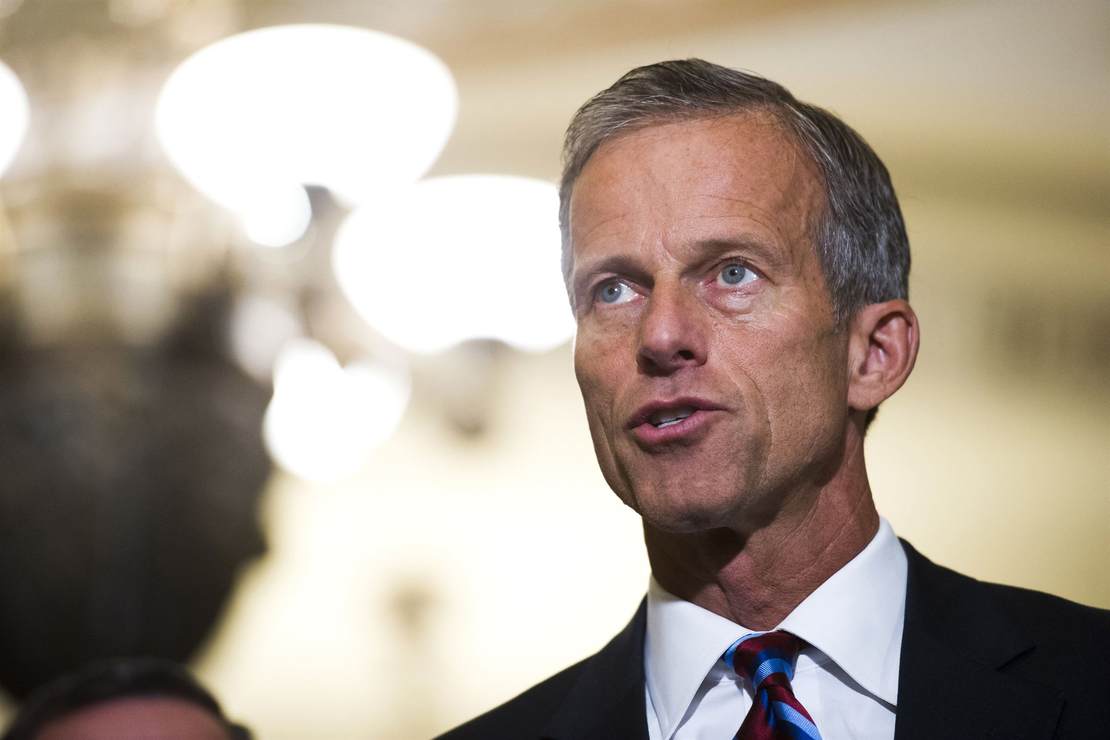
A vote on the Supreme Court nomination of Ketanji Brown Jackson is likely to happen in the first days of April. Democrats are hustling to find at least one Republican senator to vote with them in favor of the nomination. Senator John Thune predicts that she will probably receive three GOP votes. His vote isn’t one of those, though.
Thune is going by the Senate vote for her confirmation to the United States Court of Appeals for the District of Columbia Circuit in 2021.
Sen. John Thune (S.D.), the No. 2 GOP senator, predicted that Jackson won’t get more than roughly three Republican votes but noted that it wouldn’t necessarily be the same three that voted last year for her to take an appeals court post. At the time, Collins, Murkowski and Sen. Lindsey Graham (R-S.C.) backed her.
“I think the universe of votes that she could get in the Senate among Republicans is probably similar to what happened in the appeals court,” Thune said.
Most of the 50 Republican senators have either firmly declared or at least strongly indicated that they will be no votes on her confirmation. Lindsey Graham is likely a no vote this time for KBG. Collins and Murkowski will probably vote for her, if I have to guess, but Graham’s vote should be switched out for Romney’s. My prediction, following Thune’s prediction of 3 GOP votes, is yes votes from Collins, Murkowski, and Romney.
Dick Durbin calls this an important week for outreach to Republican senators. Democrats don’t need Republican votes but they want at least one so that Biden can call the vote a bipartisan one. It would take some of the shine off nominating the first black woman to the Supreme Court if the vote went down to a tie. Thune announced Tuesday that he is the latest hard no on confirmation.
Susan Collins has voted for every Supreme Court nominee since she entered the Senate with one exception. She voted against Amy Coney Barrett by using the excuse that her confirmation was too close to the 2020 election. She met with KBJ for a follow-up after the confirmation hearings. Collins said she needed some clarification to answers KBJ gave in the hearings.
Murkowski is more of a wild card than Collins. She is up for re-election and it’s a steep climb for her. Her challenger has Trump’s endorsement. Murkowski has voted for more of Biden’s nominees than most of the other Senate Republicans but a Supreme Court nominee brings more scrutiny from voters. She isn’t talking now, as she is concentrating on honoring a fellow Alaskan, Rep. Don Young, who recently passed away after decades of service in the House. However, she has said that past votes on lower court nominees doesn’t guarantee a yes on a Supreme Court nominee. She said there is a “big, big difference.” She voted against both of Obama’s nominees when she was last up for re-election. She also voted against Kavanaugh, though. Murkowski voted yes for ACB and Gorsuch.
Several Republicans have not said one way or the other how they will vote. Thune thinks they will likely wait until next week to make their decisions known.
“There are some of our members who are doing their due diligence. … I don’t think we’ll ultimately, until next week rolls around, figure out where people are,” he said.
Sen. Tim Scott (S.C.), the only Black Republican in the upper chamber, declined on Tuesday to comment on Jackson’s nomination.
READ RELATED: Pete Davidson and Kim Kardashian ‘looked closer than ever’ in Beverly Hills
Meanwhile, Sen. Richard Burr (R-N.C.), one of several retiring GOP senators, told reporters that he hadn’t yet decided on if he’ll support Jackson.
That leaves Romney. He met with KBJ on Tuesday. He wanted to talk about some of her rulings and her judicial philosophy. Romney said he is still reviewing materials and might not say how he will vote until the day of the vote. Romney loves the attention he gets when he indicates he’ll vote with the Democrats.
A Marquette Law School poll shows that two-thirds of Americans said if they were senators they would vote for KBJ’s confirmation. Half of the respondents described her as very qualified.
“She’s in better shape than a lot of the issues springing up at the court where the partisan divides can be stark,” said Charles Franklin, director of the Marquette poll, noting that President Joe Biden’s nominee has support from nearly three in 10 Republicans. “Joe Biden would love to get 29 percent of the Republican Party.”
The poll was conducted March 14-24, so it captured the widely publicized hearings. It has a margin of error of plus or minus 4 percentage points.
Jackson has 95% support from Democrats, according to the poll, and more than two-thirds of independents. She is far better recognized than any of her would-be colleagues on the court today – not uncommon for someone who has benefited from the spotlight of Senate confirmation hearings. Six in 10 respondents were able to formulate an opinion about Jackson compared with only two in 10 for Breyer.
Marquette pollsters asked half of the respondents for their opinion on Jackson’s nomination as “the first Black woman” nominated to sit on the Supreme Court and omitted that detail in the other half of their interviews. The poll found that there wasn’t a statistically significant difference based on the wording of the question.
Franklin speculated that may be because the historic nature of her nomination was already widely known. But, he said, it also suggests that some of the early criticism of how Biden went about choosing a nominee didn’t appear to have resonated. The president vowed during the 2020 campaign to name a Black woman to the nation’s highest court for the first time if he had an opportunity.
“It is an interesting and meaningful result given that some of the initial criticism before she was picked was, ‘Why is Biden narrowing the field to just this demographic group?’” Franklin said. “Our evidence, at least, is that it certainly looks like a little bit of a net positive.”
As with any other poll, take this one with a grain of salt. Conservatives were appalled to hear KBJ refuse to answer a question on the definition of a woman and her history of favoring light sentences for child sex porn convictions.
The Senate Judiciary Committee is scheduled to reconvene on April 4 for a vote that will move Jackson’s nomination to the full floor. Schumer hopes to hold a final confirmation vote before Easter recess, which begins on April 8.
Source:





